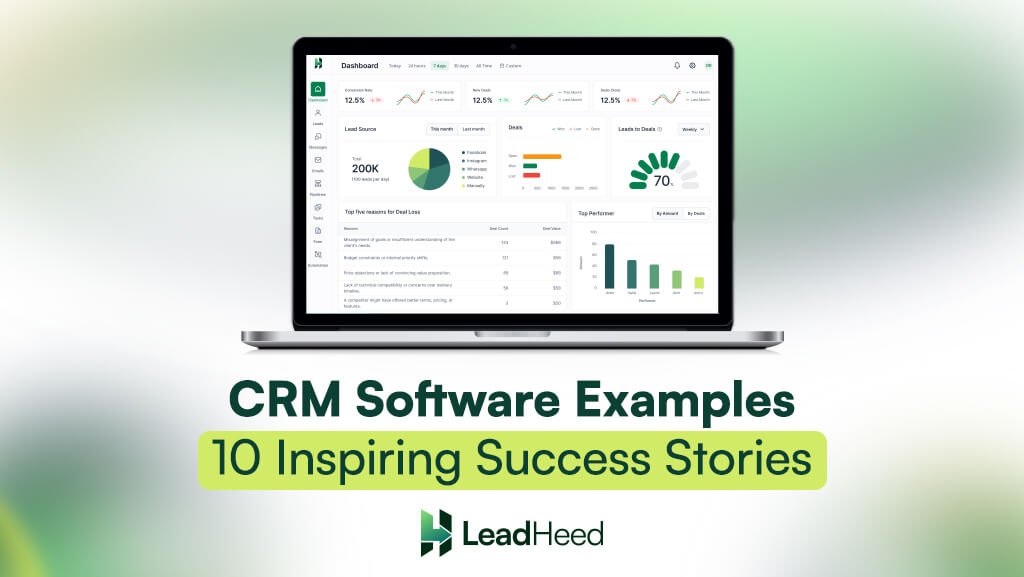Sales representatives spend most of their time outside the office, meeting clients, visiting territories, and chasing leads. But without a field sales CRM, information gets lost, follow-ups are delayed, and potential deals slip away. Spreadsheets and generic CRMs simply can’t keep up with the fast pace of field selling.
That’s where the best field sales CRM changes the game. It gives sales representatives everything they need in the palm of their hand, whether that’s GPS tracking, instant lead capture, route optimization, or mobile-first reporting.
In this guide, we’ll break down exactly what a field sales CRM is, its features, and the benefits it brings to your sales process.
What is a Field Sales CRM?
A field sales CRM is a specialised customer relationship management system designed for reps working outside the office, helping them manage leads, schedules, and updates on the go. Unlike traditional CRMs, which are often desktop-based, a field sales CRM empowers mobile sales representatives to manage their entire workflow on the go.
A field sales CRM is beneficial for industries where mobility and face-to-face interaction are crucial. Industries like retail distribution, pharmaceuticals, real Estate, B2B sales teams, logistics, and supply chain get the most benefits.
With this software, your teams can:
- Plan and manage schedules for client visits and follow-ups.
- Capture leads instantly during meetings or site visits.
- Update customer data in real time, ensuring information is always accurate and accessible.
While a standard CRM is excellent for centralizing customer data, a field sales CRM takes it further by focusing on mobility and agility. Some significant differences include:
- Real-time GPS tracking: Field sales CRMs provide GPS tracking so you can monitor representatives’ routes and activities, a feature often missing in traditional CRMs.
- Offline accessibility: While traditional CRMs usually require an internet connection, field sales CRMs allow representatives to log customer interactions offline and automatically sync data once back online.
- On-the-go lead management: Field sales CRMs enable instant lead capture and qualification during meetings or site visits, whereas traditional CRMs often rely on delayed, post-visit data entry.
What are the Key Features to Look for in a Field Sales CRM?
When searching for the top field sales CRM, look for features like mobile access, real-time tracking, task management, and integration with other tools. These features help your teams stay organized, efficient, and productive while on the move. The following are the essentials to watch out for:
1. Mobile Accessibility
Since your field employees are away from the office more often, the CRM must be fully accessible on smartphones and tablets. With a mobile-first approach, they can log visits, update customer data, and view schedules anywhere, anytime.
2. Real-Time Data and Location Tracking
The best field sales CRM should enable managers to monitor where their employees are and what they’re doing. Real-time GPS tracking assists you in optimizing routes, minimizing travel time, and holding them accountable. This also simplifies the process of assigning employees who are near an urgent lead.
3. Task and Schedule Management
Field sales representatives handle multiple client visits, follow-ups, and calls throughout the day. Task reminders, calendar scheduling, and alerts keep employees organized and ensure they never miss essential opportunities.
4. Lead Management
Leads typically come from various sources, events, referrals, cold calls, or online inquiries. A field sales CRM catches such leads in real time, directs them to the right representatives, and tracks them along the sales pipeline. This facilitates follow-ups more quickly, and conversion rates increase.
5. Sales Reporting and Analytics
Data is the key to enhancing sales performance. Top CRMs provide real-time dashboards with metrics like conversion rates and revenue projections. Managers can utilize such data to identify top-performing employees, spot bottlenecks, and make data-driven decisions.
6. Integration with Other Tools
Find a CRM that integrates with current tools such as ERP systems, email marketing tools, messaging apps, and marketing automation tools. This integration saves time, limits manual data entry, and keeps all teams on the same page.
|
Implement a CRM that fits your team’s needs today and unlock the true potential of your field sales team. |
Benefits of Using a Field Sales Software
A field sales CRM creates a measurable impact across the entire sales cycle. From helping agents stay productive to giving managers real-time visibility into performance, the right software empowers teams to work smarter and close deals faster. Below are some of the key benefits businesses get when they implement a modern field sales solution.
1. Increased Productivity for Field Employees
With mobile access, automated task reminders, and on-the-go lead management, field employees can focus more on selling rather than on administrative tasks. This reduces wasted time and helps employees achieve more in less time.
2. Better Lead Conversion Rates
By capturing leads instantly and tracking follow-ups in real time, field sales CRM ensures that no opportunities are missed. Faster response times and organized pipelines directly lead to higher conversion rates.
3. Accurate Forecasting and Reporting
Real-time analytics provide you with insights into sales performance, territory coverage, and revenue projections. This allows your business to make data-driven decisions, plan better, and avoid surprises.
4. Streamlined Communication Within the Sales Team
A field sales software centralizes updates, notes, and client interactions. This enables your teams to communicate smoothly, avoiding miscommunication and delays.
5. Improved Customer Satisfaction
With up-to-date customer information, timely follow-ups, and personalized service, employees can deliver a superior experience. Happy customers are more likely to remain loyal and recommend your business.
6. Better Decision-Making
Access to actionable insights from reporting dashboards and analytics helps you make informed strategic decisions. It also allows for quick adjustments in sales strategy to maximize results.
How to Choose the Right Field Sales CRM Software?
The right field sales CRM software matches your team’s workflow, provides full mobile access, integrates seamlessly with your tools, and scales as your business grows. Choosing a CRM without these essentials leads to lost opportunities and wasted resources. The following steps will guide you in selecting the right CRM that meets your unique needs and drives better sales performance.
1. Define Your Business Needs
Start by understanding what your team requires from a CRM, whether it’s robust lead tracking, route optimization, real-time reporting, or integration with marketing software. Creating a list of necessary features narrows down your options and prevents you from paying for unnecessary features.
2. Seek Mobile Access
Since field sales representatives are constantly on the move, mobile access is crucial. Choose a CRM with a strong mobile app for Android and iOS so that agents can update leads and access data anytime.
3. Consider Ease of Integration with Existing Tools
Your CRM must complement your current tech stack without introducing complexity. Check whether it integrates smoothly with the existing software, such as email software, messaging apps, and marketing automation software. This enables flawless workflows and reduced duplicate data entry.
4. Request a Demo
Before committing, request a demo or free trial. This allows your team to test the interface, mobile access, and key features. A hands-on enables you to determine how easy the CRM is for employees to use and if it aligns with your workflow.
5. Budget Considerations and Scalability
Consider both upfront costs and long-term scalability. Choose a CRM that fits your budget today but can also grow as your sales team expands. Avoid software that may require expensive add-ons for essential features in the future.
Top 6 Field Sales CRM Options
With so many CRM platforms available, choosing the right one for your field sales team can feel overwhelming. To make the decision easier, we’ve rounded up the top 6 field sales CRM options that stand out for their mobility, ease of use, and ability to boost productivity on the go. Each of these tools comes with unique strengths, helping businesses of all sizes find the best fit for their sales strategy.
1. LeadHeed
LeadHeed is a mobile-first CRM designed specifically for field sales teams who need real-time visibility, efficient lead management, and actionable insights while on the go. Leadheed comes with AI-driven recommendations, route optimization, and seamless integration with other business tools. LeadHeed helps sales teams work smarter, close deals faster, and stay connected no matter where they are.
Pros:
- Intuitive mobile app
- AI-driven lead prioritization
- Real-time reporting
- Smooth integration with tools
- Efficient route planning
Cons:
- Limited advanced automation
- Fewer third-party integrations
Best for:
Businesses with mobile, on-the-go sales teams that need instant access to customer data, AI-suggested leads, and optimized routes. LeadHeed’s mobile-first design and real-time data make it perfect for improving productivity, increasing lead conversion, and closing more sales.
2. Creatio CRM
Creatio CRM is a highly customizable and automation-focused CRM suitable for enterprises with complex field sales operations.
Pros:
- Extremely flexible and customizable
- Strong automation for repetitive tasks
- Detailed analytics and reporting
- Scalable for a large team.
Cons:
- It can be complex for small teams
- Higher cost than many SMB-focused CRMs
- The mobile app is less intuitive for some users
- Setup may require IT support
Best For:
Field sales teams in large enterprises requiring advanced automation, customizable workflows, and deep reporting while on the move. Creatio CRM is ideal for mobile representatives managing complex sales processes and requiring real-time insights.
3. HubSpot CRM
HubSpot CRM is a user-friendly, cloud-based CRM that integrates sales, marketing, and support tools, making it perfect for small to mid-sized businesses.
Pros:
- Free plan available
- Easy to use and intuitive interface
- Good integration with marketing tools
- Accessible anywhere via the cloud
Cons:
- Limited field sales-specific features
- Advanced reporting requires a paid plan
- Some features are locked behind higher-tier subscriptions
- Mobile app lacks some offline capabilities
Best For:
Small to mid-sized field sales teams looking for a simple, mobile-accessible CRM that supports lead management and customer follow-ups. HubSpot CRM supports seamless integration with marketing tools without requiring complex setup.
4. Zoho CRM
Zoho CRM is a versatile and affordable CRM that works well for small to mid-sized teams needing mobile access and customization.
Pros:
- Affordable pricing
- Highly customizable workflows
- Mobile-friendly design
- Strong reporting and analytics.
Cons:
- The interface can feel messy
- AI is not as advanced as its competitors
- Integration setup can be complex
- Occasional performance lags
Best For:
Field sales teams in small to mid-sized companies need a mobile CRM with flexible workflows and reporting. Zoho CRM is perfect for representatives on the go who want automation and mobile tracking without enterprise-level complexity.
5. Veloxy
Veloxy is a productivity-focused CRM that integrates with Salesforce to help field representatives improve lead follow-ups and efficiency.
Pros:
- Strong AI-driven insights
- Enhances productivity for Salesforce users
- Mobile app suitable for field representatives
- Improves lead follow-up efficiency
Cons:
- Limited standalone CRM features
- Smaller support community compared to larger CRMs
- It can be expensive for small teams
- Not ideal for highly complex sales processes
Best For:
Salesforce users with mobile field sales teams needing AI-driven lead suggestions, real-time activity tracking, and faster follow-ups. Veloxy is ideal for representatives working on the go to increase productivity and conversion rates.
6. Pipedrive
Pipedrive is a visual pipeline CRM that’s simple, intuitive, and effective for small-to-mid-sized field sales teams.
Pros:
- Extremely easy to use
- Visual sales pipeline simplifies tracking
- Mobile access for field representatives
- Affordable pricing
Cons:
- Limited advanced reporting
- Lacks extensive automation
- Not ideal for enterprise-level customization
- Fewer integrations than larger CRMs
Best For:
Small-to-mid-sized mobile field sales teams that want a simple, visual CRM for pipeline management. Pipedrive is perfect for representatives who need quick mobile access, easy deal tracking, and a streamlined sales organization on the go.
| CRM | Unique Feature | Pricing (Monthly billed) | Mobile Rating (1–5) | Best For |
| LeadHeed | AI-powered sales insights & route optimization | $15/user/month | 5 | Field sales teams need real-time tracking and predictive insights |
| Creatio CRM | Highly customizable workflows & automation | $25/user/month | 4 | Enterprises with complex sales processes and automation needs |
| HubSpot CRM | Free tier with strong marketing integration | Free – Paid plans from $15/user/month | 4 | Small to mid-sized businesses seeking an easy-to-use CRM with marketing tools |
| Zoho CRM | Affordable, versatile, and highly customizable | $8/user/month | 4 | SMBs needing mobile access and budget-friendly CRM |
| Veloxy | AI-driven productivity & Salesforce integration | $65/month | 4 | Teams already using Salesforce want enhanced lead follow-up efficiency |
| Pipedrive | Visual sales pipeline & simplicity | $24/user/month | 4 | Small-to-mid-sized field sales teams looking for an intuitive, visual CRM |
Tips for Maximizing Field Sales CRM Efficiency
Getting a field sales CRM installed is only the first step to improving team performance. To truly unleash its full potential, you need to make your team adopt it effectively and consistently. The following guidelines will help you drive maximum productivity, automate processes, and turn CRM data into actionable insights that drive sales performance.
1. Regular Training of Your Sales Team
Even the most intuitive CRM must be onboarded adequately. Have regular training sessions to teach your employees how to learn features, best practices, and receive alerts on new tools. Trained users are more likely to adopt the system wholeheartedly and use it consistently.
2. Keep Clean and Current CRM Data
Relevant data facilitates the right decisions. Have your team record interactions on time, update contact information, and remove duplicates. Clean data improves lead management, report accuracy, and overall performance of the CRM.
3. Customize Workflows to Fit Your Sales Process
Every company’s sales process is different. Get your CRM workflows, pipelines, and dashboards to reflect your team’s actual process. Tailored workflows are less friction-induced, save time, and make the CRM an integral part of day-to-day sales work.
4. Track and Analyze CRM Insights for Decision-Making
Use dashboards and reports to track performance metrics such as lead conversion rates, sales activity, and territorial coverage. Regular checking of this data allows managers to identify choke points, shift strategies, and make sound decisions to improve team effectiveness.
Conclusion
Choosing the right field sales CRM is essential for keeping your sales team agile, efficient, and competitive. With the right tool in place, you can streamline workflows, increase lead conversion rates, and deliver an exceptional customer experience. Whether you’re a small business looking for simplicity or a large enterprise needing advanced automation, the right CRM ensures your team spends less time on admin tasks and more time closing deals.
At LeadHeed, we’ve built our platform with field sales teams at the center. From AI-powered insights and intelligent route optimization to an intuitive mobile app designed for on-the-go agents, LeadHeed ensures your sales team never misses an opportunity. It’s not just a CRM, it’s a productivity companion that helps you sell smarter, faster, and with greater confidence.
FAQs
How does a field sales CRM differ from a regular CRM?
A regular CRM is typically desktop-focused, while a field sales CRM is optimized for mobility. It includes features like GPS tracking, offline access, and route management, essential for on-the-go sales representatives.
How do I choose the right field sales CRM for my business?
Start by identifying your business needs (e.g., lead management, territory tracking, reporting). Then, check mobile usability, ease of integration, scalability, and request a free demo before committing.
Can a field sales CRM improve my team’s sales efficiency?
Yes. A field sales CRM streamlines scheduling, reduces manual data entry, enables faster follow-ups, and provides real-time insights. This leads to higher productivity, better lead conversion, and improved customer satisfaction.
Which industries benefit the most from field sales CRM software?
Industries like FMCG, pharmaceuticals, real estate, retail distribution, and B2B sales benefit the most since their sales teams are highly mobile and need real-time tracking and reporting.



